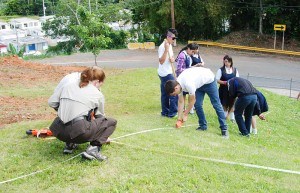Can you measure love? Or happiness? Or objectivity? Are there some things we can’t measure, or shouldn’t try to? The issue of qualitative versus quantitative comparison is a matter of controversy in the social sciences. It is also often a source of false divisions between science (where everything is taken to be measurable) and the arts (where the values involved cannot be measured).
One area where science can become dogmatic is if it takes the attitude that all variables worthy of investigation should be measurable. To be able to measure something, it needs to be publically available, and there need to be agreed units in which you can measure it. However, not everything worthy of investigation is publically available (especially mental events such as desires, meanings or beliefs). Although we have agreed units to measure many physical properties, such as length, wave frequency or force, we do not have agreed units to measure, say, the strength of a belief.
However, this doesn’t stop a quality like the strength of a belief from being incremental (a matter of degree). The strength of a belief can be recognised as incremental, and thus within the sphere of experience, without being quantifiable. Rather, we can talk about the strength of a belief in qualitative terms, but incremental ones. The language that makes it incremental is liable to be vague – but deliberately so. For example, you could say that “Fred tentatively believes that his cat is ill” or “Xavier is fairly happy”. It really wouldn’t add anything to these vague degrees if we were to impose a fake precision on them. “Fred has 0.36 of a belief that his cat is ill” or “Xavier is 69% happy” would just impose a dogmatic belief in measurability on material that is not accessible in that kind of way. It would convey the deluded idea of precision without applying any genuine precision. We don’t have to get into such fake precision to use incremental qualities.
We also need to recognise the provisionality and uncertainty attending even precise measurements of physical objects. You can measure the block and find it 32.5cm long and 12.34 cm wide, but this  measurement still lacks precision when considered much more closely. Different people might measure the same thing differently, even using the same instruments. We also cannot rely absolutely on the constants on which units of measurement are based (such as the speed of light), because these are only based on measurements so far, subject to human errors, false assumptions and further changing conditions. Practically speaking, these uncertainties are unlikely to make much difference, but they still justify us in maintaining a degree of provisionality when we maintain belief in any quantification.
measurement still lacks precision when considered much more closely. Different people might measure the same thing differently, even using the same instruments. We also cannot rely absolutely on the constants on which units of measurement are based (such as the speed of light), because these are only based on measurements so far, subject to human errors, false assumptions and further changing conditions. Practically speaking, these uncertainties are unlikely to make much difference, but they still justify us in maintaining a degree of provisionality when we maintain belief in any quantification.
At the other end of the spectrum are absolute qualities. One central claim in Middle Way Philosophy (which has been adopted from empiricism) is that no quality in experience is absolute. We can think absolutely about, say infinity, perfection, nothingness, or irreducibility, but we can only do this in abstraction. Such abstractions are meaningful to us, but we can’t justify any belief in their pure occurrence (or pure absence) in experience.
So, I’d suggest some principles can be applied to issues of quality and quantity using the Middle Way:
1. Qualities can and should be incrementalised if they have an application in experience.
2. Incrementalised qualities are still worthy of investigation, even though they are vague.
3. Precise quantification carries a degree of uncertainty that needs to be recalled.
4. Our judgement of each thing should be treated only with the degree of precision that the thing can bear in experience.
Exercise
Try to classify the following. Are they (a) precisely measurable (though with uncertainty), (b) vague incremental qualities, or (c) absolutes applicable only in the abstract?
1. The earth’s magnetic field
2. The beauty of the Mona Lisa
3. Tony Blair’s charisma
4. Logic (i.e. correct inference)
5. The energy contained in a cereal bar
6. The freedom we enjoy in a democracy
7. The goodness of God
8. The smelliness of a pair of dirty socks
Index of past blogs on the Critical Thinking course
Picture: ‘Measurements’ by US Fish and Wildlife Service SE Region (Wikimedia Commons)
